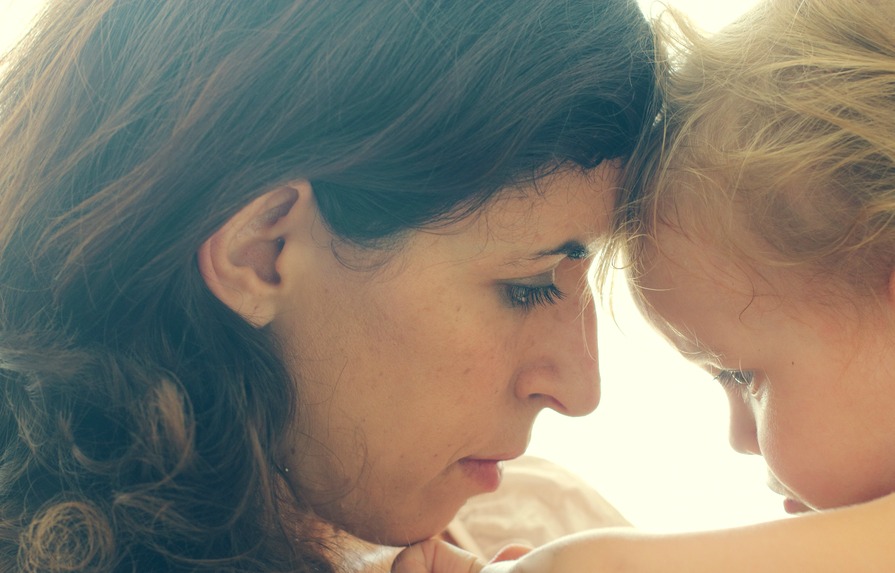In my nursing school maternity rotation, I remember briefly talking about the “baby blues”. It sounded so benign and universal, like a shadowy cloud quickly drifting through the sky, crying a few tears as the hormones crash. In my mental health rotation, the idea of postpartum psychosis seemed like a rare anomaly on the opposite end of the spectrum.
It never occurred to me there were a thousand different experiences in between.
From Birth to Postpartum Depression – And Everything In Between
The emotions I experienced after giving birth shocked me. I had never experienced anything of that intensity, or that out of control, in my life. I cried all of day three postpartum. My midwife was there to tell me it was normal and gradually I adjusted. I found a letter years later I had written my daughter when she was colicky, in it, I apologize for bringing her to earth where she had to feel so much pain. Reading it outside of the moment, I realized just how altered my mental state must have been.
With my second baby, the waters were smooth. Other than a few tears on day three that I knowingly embraced as a physical reaction to hormonal shifts, I felt tired but happy. She was born in the summer and the days were sunny.
Then baby number three. We had feeding issues from the beginning. I was in pain physically and mentally distressed at my perceived failure. I quickly spiraled into day three on repeat. I couldn’t stop crying. It was like a fog had settled. It took a solid support network to see me through.
Some Postpartum Truths
My experiences made me curious, as I’ve watched my friends experience postpartum depression and talked to the moms in the NICU where I work I began to see themes emerging.
No two experiences are alike.
Every woman who enters into childbearing comes with a unique genetic makeup. If there is a family history of depression her risk of experiencing it herself goes up. Each pregnancy is unique and depression may even begin in pregnancy. A loss in pregnancy or the delivery of a baby with complications increases the risk again. A traumatic delivery can result in symptoms of post traumatic stress for women, and for their partner, again increasing the chances that she will experience a form of postpartum depression.
Even the same person, as in my case, can have completely different experiences with each baby.
Having a baby is something you need to recover from both physically and mentally.
While having babies is commonplace, the immensity of this life shift is often downplayed. Media is saturated with women looking great after recently giving birth. Social media allows us to share the good moments, while withholding the bad, causing a skewed perspective. In many cultures around the world, women are honored after birth for a period of time. They are taken care of and encouraged to take the time to heal physically.
The recovery needs to fit the person.
Some women may find that staying home and having help with the baby care is what they need to recover. Other may need to get out, and themselves be supported in caring for their families. When we apply a prescribed solution to our stress because a nurse, our Mother in Law, or the internet told us we should, it can have the opposite effect. It can be difficult to advocate for our mental health needs when culture dictates something different.
For me, I had a lot of anxiety about others taking care of my existing children. The money and stress of putting them in care to help me when I was struggling would have had the opposite effect I wanted it to.
Birth and caring for a newborn sets you up for poor self-care.
Caring for a new baby is demanding. Even if delivery is ideal, and often it’s not, women and their partners are faced suddenly with broken sleep, learning how to take care of a baby, and remembering to eat. There can be unresolved feelings about the pregnancy and birth. If women are the first in their families and peer groups to have a baby it can be isolating. Many moms joke about never being able to shower or even go to the bathroom alone, but having to renegotiate these basic behaviors of self care can contribute negatively to mental health.
It’s something that isn’t talked about that much especially to new moms.
Recently, women have begun speaking out about the mental challenges that come along with a new baby. From celebrities, to friends over coffee, there has been a big shift towards realization, that while postpartum mood disorders are concerning and should be treated, they are common.
When the stigma is removed it gives women the confidence to admit they are struggling, which is often the first big step towards recovery. When shame stops women from speaking out, it also fosters denial. Instead of spending energy on finding treatment, it can be easy to put all that energy into convincing ourselves that these feeling aren’t real.
There are things to do to help prevent it.
There are many things we can do to buffer the stress of having a baby. Managing expectations is the biggest one. Having a realistic view of just how little sleep, or how hard breastfeeding will be, can go a long way in normalizing it when it happens. If women realize the challenges, they can be prepared with meals, knowing where to get support for feeding, and strategies for getting rest.
It has taken me three kids to finally acknowledge that self-care is not an indulgence. It is a necessity that makes me a better mom. It’s also something that looks different at each stage of motherhood. When I had a newborn just having 20 minutes for an uninterrupted shower was amazing. As my kids get older I’m looking forward to a whole weekend away.
There are things to do to fix it.
All the things that help depression can be used to fight postpartum mood disorders with some creativity.
-
Walk
My easiest postpartum was in the summer where we walked every day out in the sun. It’s harder when the weather is cold and dreary, but getting out even if it’s just for a brisk walk in the mall before the stores open, can make a big difference.
-
Connect
Some of my best friends still are coworkers who had babies at the same time. We would drag each other out for walks even when we didn’t feel like it and be reminded that it’s hard for everyone as we shared our joys and struggles with motherhood.
-
Recharge
Mindfulness and relaxation are important too. From baby and me yoga to listening to a relaxation meditation or mindfulness app while the baby is sleeping. I used instagram to take pictures everyday of the small things I was a grateful for.
-
Nourish
Then there is nourishment. It is so easy to forget to eat and drink when there are small people demanding our attention but our bodies need whole, healthy foods and plenty of water to recover from birth, to produce milk and to cope with caring for a baby. Sometimes good food need to be supplemented with iron, omega 3s and other vitamins to address specific deficiencies as well.
-
Medication
Then there is medication. There comes a time when the symptoms of depression and anxiety are so overwhelming that all of the above seems insurmountable. Medication can be the one thing that allows women to reclaim their life. It can be what it takes to bring them back to a place where they are capable of eating, drinking and sleeping.
It doesn’t make you a bad mom.
There is a lot of shame around perinatal mood disorders. There is shame for many of us who thought we could do it all and were sideswiped with realizing just how challenging motherhood can be. There is guilt over needing medication, and over not taking it, over stopping breastfeeding, and for powering through.
Shame and guilt has become the norm for so many parenting decisions. When moms are vulnerable with their stories of how hard it is, and the many factors that went into their decisions, it is harder to judge and easier to empathize. Managing expectations can only be done when other mothers share not just the joys, but the challenges.
When We Share our Story
When I share my struggles with motherhood it is met with an overwhelming response of “me too.” Knowing that other moms feel the same way makes it harder to believe there is something wrong with me. It’s normalizing.
All women find parts of motherhood challenging, as it should be. The task of raising human beings is one that comes with great honor, but also great expectations from society and ourselves. There is so much pressure to find the one right way that we’ve lost sight of the millions of good ways.
Knowing that anger and anxiety, sadness and numbness are all things that come with the positive emotions of having a baby, can leave us prepared for both. It’s normal to feel everything.
When the negative feelings take over and crowd out the joy and the happiness, when they steal the peace and the calm, knowing that it is ok to seek help can aid in creating a better balance.
When we suffer alone, we fight alone and it becomes a vicious circle of not realizing we need help, and not realizing that we are not alone.
If you, or someone you know is struggling with the emotions that come with pregnancy and postpartum, which left untreated can extend far into motherhood, Postpartum Progress is an excellent resource. It has everything from current research to personal stories.
Women shouldn’t suffer alone. As a society we need to care for our mothers who are raising the next generation. Then they can be empowered and equipped emotionally to do it well. It affects us all.
 About the Author: Jenn Shehata
About the Author: Jenn Shehata
Jenn is a messy mom and ordinary nurse living a beautiful life. She writes to remember and to reimagine the story. You can find her at www.cryandnurseon.com writing about motherhood and nursing and all the thing that make her cry.
When she’s not chasing her three kids, watching Netflix with her husband, or working in the NICU, she is a voracious reader, always looking to understand the world better through people’s stories. Preferably with a latte in hand.
Find out more about Jenn on Facebook, Pinterest, and Twitter.



Leave a Reply